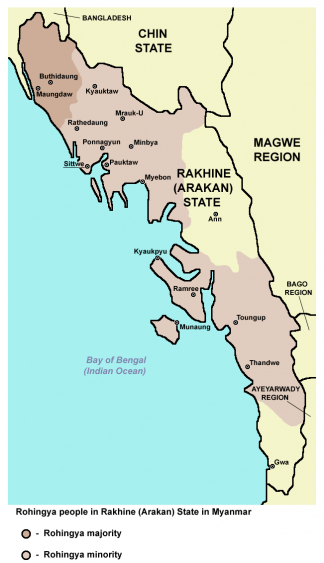
Map of Rohingya people in Rakhine State. This file is made available under the Creative Commons CC0 1.0 Universal Public Domain Dedication.
By Susan Gangl
In less than two months, 500,000 Rohingya Muslims have fled Myanmar and crossed into Bangladesh to escape persecution. The United Nations has called it the world’s fastest developing refugee crisis, and relief agencies are finding it difficult to meet the need for food, water, shelter, and medical care.
The Rohingya have lived for centuries in the majority Buddhist Myanmar and about 1.1 million Rohingya currently live in the Southeast Asian country, in which they have been denied citizenship since 1982.
How and why are they being persecuted? Why aren’t they recognized? What can be done to alleviate this crisis?
This post is intended to provide information on recent news, current research, and reliable information to help you better understand and think critically about these issues.
Freely available news articles
- Myanmar: Who are the Rohingya?
Aljazeer, September 28, 2017 - How the Rohingya Crisis Is Changing Bangladesh
New York Times, October 6, 2017 - Rohingya crisis: Finding out the truth about Arsa militants
BBC News, October 11, 2017 - Intimate Pictures Capture The Pain Of The Rohingya
National Public Radio, October 8, 2017 - Bangladesh to move 800,000 Rohingya into single enormous camp
CNN October 6, 2017 - For Half A Million Rohingya Fleeing Myanmar, Bangladesh Is A Reluctant Host
National Public Radio, October 16, 2017
Books at the University of Minnesota Libraries
- The Rohingyas of Arakan : history and heritage
Mohammed Mohibullah Siddiquee - A tale of refugees : Rohingyas in Bangladesh
Abdur Razzaq; Mahfuzul Haque - To host or to hurt : counter-narratives on Rohingya refugee issue in Bangladesh
Dhaka : Institute of Culture & Development Research 2012
Government Documents
- Burma’s challenge : democracy, human rights, peace, and the plight of the Rohingya
Hearing before the Subcommittee on Asia and the Pacific of the Committee on Foreign Affairs, House of Representatives, One Hundred Fourteenth Congress, first session, October 21, 2015. - Urging the government of Burma to end the persecution of the Rohingya people and respect human rights for all ethnic and religious minority groups within Burma…
Markup before the Subcommittee on Asia and the Pacific of the Committee on Foreign Affairs, House of Representatives, One Hundred Thirteenth Congress, first session, on H. Res. 418 and H. Res. 281, December 11, 2013. United States. Congress. House. Committee on Foreign Affairs. Subcommittee on Asia and the Pacific,; United States. Congress. House. Committee on Foreign Affairs. - Ukraine Support Act : urging the government of Burma to end the persecution of the Rohingya people and respect internationally recognized human rights for all ethnic and religious minority groups within Burma; and affirming the importance of the Taiwan Relations Act
Markup before the Committee on Foreign Affairs, House of Representatives, One Hundred Thirteenth Congress, second session on H. R. 4278, H. Res. 418 and H. Res. 494, March 25, 2014. United States. Congress. House. Committee on Foreign Affairs,; United States. Congress. House. Committee on Foreign Affairs.
Freely available online information
- Human Rights Watch
- The Brookings Institution, a nonprofit public policy organization in Washington, D.C.
University of Minnesota Libraries expertise
The following librarians can provide you assistance in seeking additional source material on this subject:
- Susan Gangl, Librarian, Arts & Humanities
- Alicia Kubas, Government Publications and Regional Depository Librarian
- Nancy Herther, Librarian for Sociology, Anthropology, American Indian Studies, American Studies, Asian American Studies & Disability Studies
- David Faust, Librarian for South Asia and Middle East Studies.





Susan, I am working with ActionAid in Bangladesh on a small project to provide a Dignity Kit- including a change of clothing- to every woman and girl who was raped or sexually assaulted and now resides in a refugee camp. Right now many of these women live in the same clothing they had on when they were raped or sexually assaulted. My project will be called Project Dignity and should be up and going by January 20th, 2018. I am local and hoping you might provide me with local MN contacts who will help publicize my efforts. There will be a kickoff event later this month to try and raise $25 contributions- the cost of a Bangladesh produced Dignity Kit- and I will need help spreading the word. I am doing this as an individual because I want to show that one person can make a difference. Please give me a call or email so we can discuss this and how I can connect to the UMN community. Dr.James Gambone, Graduate Professor of Public Health, Capella University.